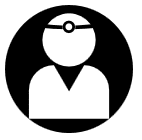 Experienced nurses know that earning a degree in nursing is unlike any other college experience. In addition to rigorous classroom-based courses, nursing students participate in labs and clinical practicums that help them train for professional opportunities. While other types of college programs may prepare you academically for your career goals, nursing programs feature practical skill-building and challenging real-life situations designed to expose students to the realities of nursing.
Experienced nurses know that earning a degree in nursing is unlike any other college experience. In addition to rigorous classroom-based courses, nursing students participate in labs and clinical practicums that help them train for professional opportunities. While other types of college programs may prepare you academically for your career goals, nursing programs feature practical skill-building and challenging real-life situations designed to expose students to the realities of nursing.
It’s not for everyone, but if nursing is your dream vocation, you’ll likely find nursing school to be an exciting challenge that tests you physically and mentally while pushing you to achieve in ways you never thought possible. So how can you prepare to succeed in nursing school? For starters, make sure you read this advice for nursing students, which features 10 tools, items and habits.
An up-to-date drug guide. Lippincott’s Nursing Drug Guide and Davis’s Drug Guide for Nurses are two popular picks, though your nursing program may require a different guide. Familiarizing yourself with your guide of choice and referring to it often will be a key part of your clinical training, as being able to quickly reference drug information and side effects is critical.
A medical dictionary. Taber’s Cyclopedic Medical Dictionary and Mosby's Dictionary of Medicine, Nursing & Health Professions are common choices. Carry this around wherever you go for quick reference. You can also find online versions, but many students prefer a pocket medical dictionary for use in situations when electronic devices are not permitted.
The right technology tools. PDAs or smart phones help nursing students stay organized and manage their schedules. You can also benefit from a wide variety of online tools and apps designed for practicing nurses and students alike. Some helpful apps include NurseTabs: Fundamentals, which allows nursing students to look up how-tos for common skills and procedures, and Lab Values Reference, which helps users analyze the results and indications of 375 common laboratory tests.[i]
Good, basic equipment. Stick to the essentials as you acquire your beginner’s nursing equipment, but be sure to invest in quality tools that will serve you well in your studies and beyond. A stethoscope, trauma scissors, hemostats, a digital watch, and a dependable writing implement are must-haves.
Comfortable shoes. Nurses are always on their feet, and students undergoing clinical training quickly realize that footwear matters. Shoes should provide cushioning and all-day support. Many nurses swear by Danskos, Crocs, or MBTs.
Well-fitting scrubs. You shouldn’t have to think about what you are wearing during the course of the day, so invest in scrubs made of comfortable, breathable fabric. Make sure the pants stay up – some nurses prefer tie waists, while others like elastic. It’s useful to have plenty of pockets for storing supplies like pens, alcohol wipes, scissors, hemostats, etc.
Good note-taking skills. Whether you record lectures to review later or take detailed notes in class, knowing how to document important points is a critical part of nursing school. Initially, many students are overwhelmed by the sheer volume of information presented. Note-taking helps you break down and process lectures, textbook chapters, and clinical experiences; doing it effectively is a skill every nursing student must learn.
The ability to prioritize. To avoid burnout, you must focus on what matters most during nursing school. Many nursing students juggle responsibilities like work, children, and relationships in addition to their studies. While you likely cannot set all of your duties aside in order to focus 100% on nursing school, you should be prepared to limit or temporarily give up nonessential commitments. Realistically, you can’t party all weekend and still be well-rested and prepared for class – the curriculum is too demanding.
Acceptance. Nursing school can be tough; perfectionists often have to revise their expectations and accept that mistakes are part of the learning process. You may have been a straight-A student in high school, only to find that you fail your first exam in nursing school. You may have awkward or embarrassing moments during clinicals that cause you to doubt your abilities. It’s important to pick yourself up, double your efforts, and move on after a failure.
Certainty that nursing is the career for you. Nursing school demands your full commitment, and the students that succeed are both excited about their chosen career path and willing to overcome the day-to-day challenges and setbacks of becoming a nurse. If you aren’t sure that nursing is for you, get some volunteer experience at a hospital or nursing home prior to making the decision to enroll in nursing school. Even a little experience in a hospital setting will help you to discover important truths about yourself – like squeamishness around needles or whether you are truly interested in and passionate about the nursing profession.
